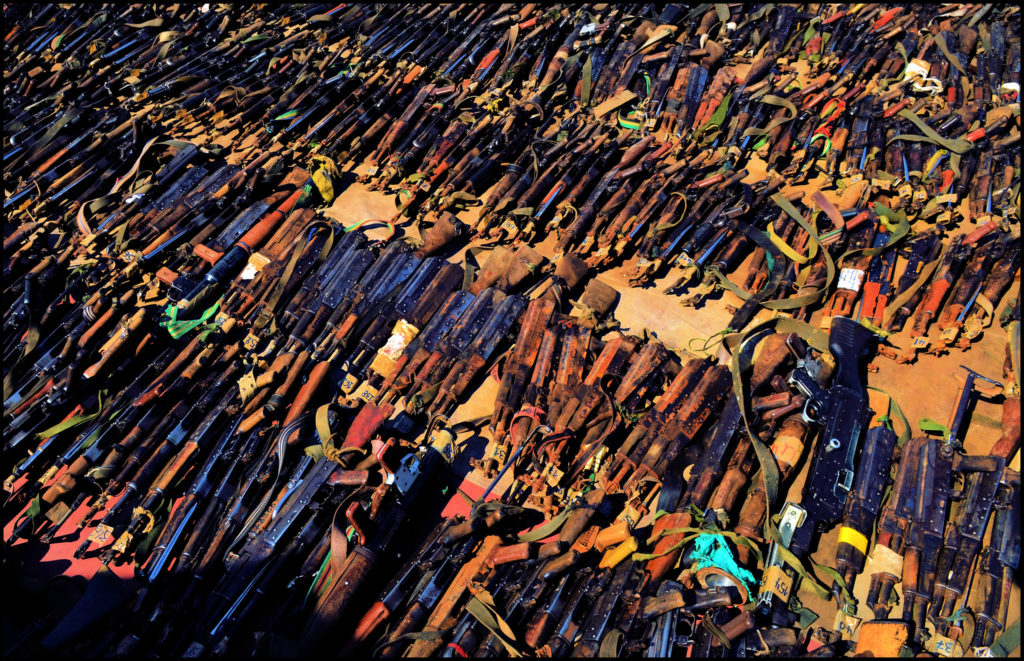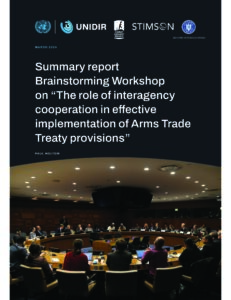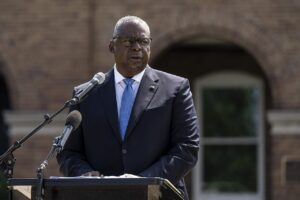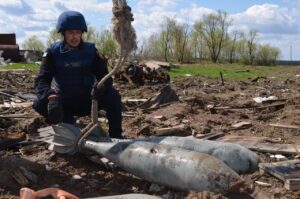
Shannon Dick is the Research Analyst and Deputy Director of Stimson’s Conventional Defense Program. Her research focuses on issues pertaining to US security assistance and the international arms trade, including policies guiding US arms transfer decisions, efforts to prevent the recruitment and use of child soldiers, and opportunities and challenges presented by emerging weapons technologies.
Why does the Conventional Defense Program’s work matter?
The Conventional Defense Program recognizes that countries and institutions with access to lethal weapons and technologies have the capacity to do great harm – whether intentional or unintentional. We focus on mitigating that harm by educating the public and practitioners about how states manage and oversee the use of weapons and lethal force.
A key component of our work is engaging directly with officials and experts around the world to improve the laws, policies, and regulations that guide arms transfers and ultimately reduce the risks associated with such transfers. Practically speaking, that means analyzing existing government policies and processes, identifying what’s being done well and what’s missing, and then providing analyses, trainings, and recommendations to help states and institutions improve their control systems and oversight processes.
To me, this work is particularly important because arms trade issues are ever-present and can relate to all matters of foreign policy and international security – yet are rarely prioritized. Too often, the true impact of the global arms trade goes unseen outside of those communities that are directly affected, even though its effects disrupt lives and livelihoods every day. And that’s a key challenge: How do you get people to care about things that happen every day that they are either disillusioned to, don’t know about, or don’t have the capacity to address because they are focusing on other issues or crises? For our program, we try to help them care, and then act.
What are you most proud of?
One thing I get excited about is when I see the reach of our training assistance work around the world. This work helps states review and improve their arms transfer control systems, both to support comprehensive implementation of the global Arms Trade Treaty and, more broadly, to facilitate responsible, transparent, and accountable arms transfer decision-making. It’s so technical and wonky, but also so beautifully central to the Conventional Defense Program’s ethos. It illustrates our unique approach and value add to the broader conversation about improving arms transfer controls. I’ve contributed to this work to varying degrees since my first day at Stimson and being able to participate more directly in that process and be an ambassador for that work has been very rewarding.
I’m also proud of my own professional growth and of my career at Stimson. I started here as an intern, and now I’m managing and guiding new people within the community. And that has been incredibly rewarding – helping younger professionals become familiar with and navigate our varied issues. But it’s shocking how entrenched imposter syndrome is. The conventional arms trade and security assistance community is quite small, and I do get anxiety about speaking as an expert alongside people who have been doing this work for decades. So while I often ask myself if I’m the right person to be doing this, I’m also reminded that I’ve grown into this role and have a lot to contribute to my program, people with a curiosity for and/or an interest in these issues, and the larger field. And I see that as a privilege and an opportunity.
What is something you wish people understood about your work?
I wish people better understood the humanitarian consequences of the arms trade. Fundamentally, conventional weapons are tools of conflict and violence. And when talking about the arms trade, you can’t divorce acts of conflict and violence against individuals, groups, or communities from those tools. So, if you’re talking about an arms sale, then you are also talking about what that weapon is used for and who it will be used against. I wish more people would make that one-to-one connection. And from a U.S. policy perspective, we have to be very cognizant of the role and responsibility of the United States in the global arms trade. The United States is the world’s leading arms exporter by a significant margin. With that comes considerable responsibility, because there is the potential to have great influence over foreign policy outcomes as well as the potential to perpetuate great harm. I wish people, especially those in positions of power, better understood that these issues are really issues of American values rather than issues of politics. They are about how the United States views itself in the world, how it understands and manages its ability to impart leverage into foreign policy and international security discussions, and how it prevents or contributes to human suffering.
Learn more about the Conventional Defense program.




